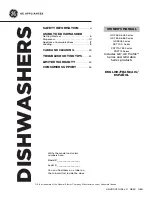
fig.1
Installation
Positioning the Appliance
Position the appliance in the desired location. The back should
rest against the wall, and the sides along the adjacent cabinets
or wall. The dishwasher is equipped with water supply and drain
hoses that can be positioned to the right or left to facilitate proper
installation.
Levelling the Appliance
Once the appliance is positioned, adjust the feet (screwing them
in or out) of the dishwasher until it is level. In any case, the appli-
ance should not be inclined more than 2
°
. If the appliance is level,
it will help ensure proper performance.
Cold Water Connection
Connect the cold water supply hose to a threaded 3/4 (gas) connec-
tor and make sure that it is fastened tightly in place (see fig.1).
If the water pipes are new or have not been used for a prolonged
period of time, let the water run to make sure that the water is
clear and free of impurities. If this precaution is not taken, there is
a risk that the water inlet can get blocked and damage the
appliance.
Hot Water Connection
The water supply to the appliance can also be connected to the
house's hot water line (centralised system, heating system), as
long as it does not exceed a temperature of 60
°
C.
In this case, the wash cycle time will be shortened by about 15
minutes and the wash efficiency slightly reduced.
The connection must be made to the hot water line following the
same procedures as for the connection to the cold water line.
Drain Hose Connection
Insert the drain hose into a drain pipe with a minimum diameter
of 4cm, or let it run into the sink, making sure to avoid bending
or crimping it. Use the special plastic support that comes with
the appliance (see fig .2). The free end of the hose must be at a
height between 40 and 100 cm and must not be immersed in
water.
Attention:
The special plastic hose support must be solidly fastened to
the wall to prevent the drain hose from moving and allowing
water to spill outside the drain.
Electrical Connection
After making sure that the voltage and frequency values for the
current in the home correspond to those on the rating plate
(located on the stainless steel inner door of the appliance) and
that the electrical system is sized for the maximum voltage on
the rating plate, insert the plug into an electrical socket which is
earthed properly (the earthing of the appliance is a safety re-
quirement mandated by law).
If the electrical socket to which the appliance must be connected
is not appropriate for the plug, replace the plug rather than using
adaptors or the like as they could cause overheating and burns.
fig.2
.10.
GB






























